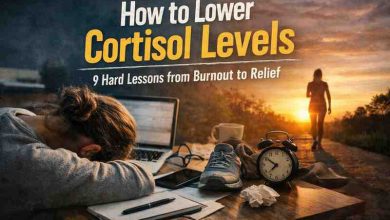

I Thought I Was “Fine”… Until I Collapsed in the Produce Aisle 🛒
It was a Tuesday. Hot, muggy, one of those days where your shirt sticks to your back before 9 a.m. I remember grabbing a bag of spinach, then waking up with my cheek against cold tile and the smell of bananas way too close for comfort.
The EMT said it might be dehydration. My doctor thought anxiety.
It wasn’t until my third ER visit that someone finally used the words:
“You might be dealing with Heart Failure with Preserved Ejection Fraction.”
Heart failure? Me? With a preserved what now?
I didn’t get it. My ejection fraction (how well my heart pumps) was normal. So how could my heart be failing?
Spoiler: It can. And it does. More than people realize.
Especially for women. Especially for people like me, who “don’t look sick.”
What Is Heart Failure with Preserved Ejection Fraction (HFpEF)?
From Someone Who’s Lived It — Not Studied It
I’m not a doctor. But I am someone who’s fought, feared, and finally (kind of) made peace with HFpEF.
Here’s how I explain it to friends over wine (decaf now… sigh):
Your heart has one main job—pump blood. In HFpEF, it still pumps OK, but it’s become stiff, like a balloon that doesn’t fully relax between beats. That means it can’t fill with enough blood. So less blood gets pushed out each time.
Imagine trying to breathe through a straw. That’s what walking across my living room felt like during flare-ups.
The irony? Test after test showed my ejection fraction was “great.”
And yet—I couldn’t walk up a flight of stairs without needing to sit down and cry.
1. It Doesn’t Look Like Heart Failure. But It Sure Feels Like It.
I always thought “heart failure” meant heart attacks and defibrillators and hospital beds.
Nope.
With HFpEF, symptoms creep in like fog:
-
Fatigue that feels like your soul is dragging
-
Shortness of breath doing stupid things, like brushing your hair
-
Swelling in your ankles that makes your shoes not fit by noon
-
Racing heart when you’re doing… absolutely nothing
I started thinking I was lazy. Or depressed. Or both.
It wasn’t until I tracked my symptoms and showed my cardiologist actual notes (yes, I’m that girl with a symptom spreadsheet 🫠) that we figured it out.
2. Doctors Don’t Always Catch It—You Might Have to Push (Hard)
This one makes me furious. I saw four doctors before anyone said “HFpEF.”
One told me I was just “deconditioned.” Another hinted it might be perimenopause.
It’s especially common for women to get brushed off. Our symptoms show up differently.
And if you’re not old, male, and gasping on a treadmill, they might not see it.
But here’s what helped:
-
Keeping a diary of my symptoms (fatigue, swelling, sleep disturbances)
-
Tracking blood pressure (mine was sneakily high at night)
-
Not accepting “your tests are normal” as a full answer
I also got a natriuretic peptide test and echocardiogram with diastolic function—these finally gave me the diagnosis.
3. Low-Sodium Diets Actually Made a Difference (After I Stopped Cheating) 🧂
I used to roll my eyes when doctors said to cut salt. Like, cool—just remove all joy from food, got it.
But I got desperate. The swelling in my legs got so bad I couldn’t zip my boots.
So I finally tried:
-
Cooking 90% of my meals at home
-
Ditching deli meats (💔 goodbye, turkey sandwiches)
-
Using lemon, herbs, and smoked paprika like a damn magician
Within 10 days, I saw the swelling vanish. And get this—my Fitbit stopped showing weird overnight spikes in heart rate.
Now I’m not saying food fixed everything. But when I clean up my diet? My heart behaves.
4. Exercise Helped… But Only After I Got Out of My Own Way
“Just move more!”
That’s what they told me. But walking around the block felt like a marathon at first.
Eventually, I found a rhythm. It looked nothing like my old workouts. And that was hard. Ego-wise.
Here’s what actually worked:
-
Gentle yoga (I cried the first time I managed child’s pose without dizziness)
-
3-minute walks around the house, spaced out every hour
-
Resistance bands while sitting (bonus: they’re great for Netflix marathons)
Now I can do 20 minutes on the recumbent bike without gasping.
Still, I have flare days. And that’s OK. I don’t push through anymore—I pace myself. Literally.
5. Medications Are Trial-and-Error Hell… But Worth It
I went through what felt like a pharmacy aisle of pills.
Some made me pee every 15 minutes (looking at you, diuretics).
Some gave me crushing headaches. One even made my vision blurry for a week.
Eventually, my doc and I found a combo that didn’t suck:
-
Low-dose beta blockers
-
ARNI meds (this was a game-changer)
-
A touch of spironolactone
But honestly? The best medicine was a cardiologist who listened.
If yours doesn’t take your symptoms seriously, fire them. Seriously. You’re allowed.
6. Stress Is My Sneaky Trigger (and It’s Hard to Avoid) 😤
I didn’t want to believe it. But every time I had a stressful week—like when my boss dumped three deadlines on me or I fought with my sister—BOOM:
-
Fatigue
-
Breathlessness
-
Chest pressure (not pain, just that freaky tight feeling)
I started tracking these flares. 8 out of 10? Linked to emotional stress.
So I started doing something I never thought I’d do.
Meditation.
Yes, me. The girl who couldn’t sit still if you paid her. I downloaded a cheesy app and forced myself to breathe for 5 minutes a day.
And it helped. Along with:
-
Coloring books (no judgment)
-
Saying no (a lot)
-
Leaving group chats on read (sorry, not sorry)
7. It’s Not Curable. But It’s Manageable. And You’re Not Alone.
There’s no magic pill. No surgery to fix it. And that used to wreck me.
But here’s the thing:
I’m not the same person I was when I fainted in that grocery store.
I get my body now. I understand its whispers before they become screams.
And more importantly—I’m not ashamed anymore.
Not of needing rest. Not of carrying around pill bottles. Not of saying, “I have heart failure,” and letting people be confused when I don’t look sick.
So… What Do I Wish I’d Known Sooner?
If you’ve just been diagnosed with Heart Failure with Preserved Ejection Fraction—or you suspect you might have it—here’s what I want to DM you straight from my heart (pun intended):
-
You’re not imagining it.
-
You’re not lazy.
-
You don’t have to be perfect to feel better.
-
Small changes matter—like really matter.
-
Find doctors who see you, not just your chart.
This condition is weird. It’s frustrating. It’s invisible.
But it’s not unbeatable.
Some days I still grieve the old me. The one who could sprint for the train or stay up late without paying for it the next day.
But this version of me? She’s softer. Wiser. Way more in tune with what matters.
And her boots zip up now.



